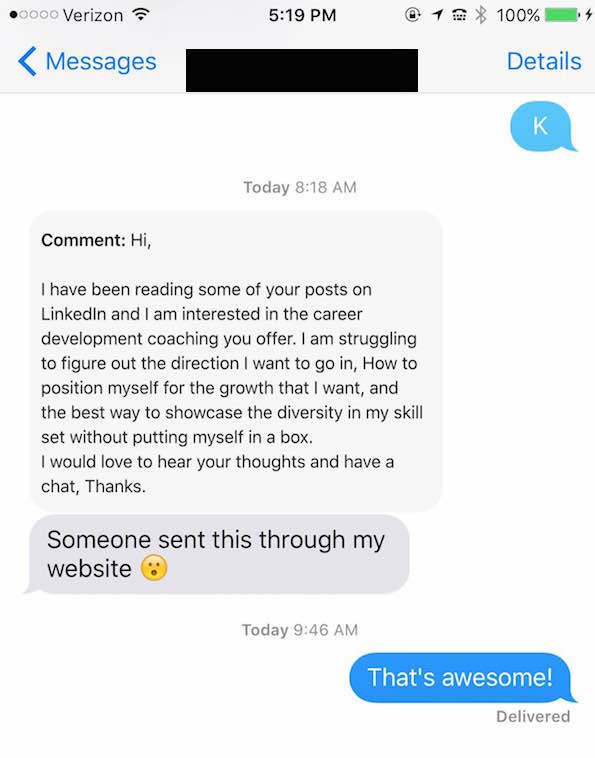At the time of writing, my very first professional blog has generated over six figures in revenue since its launch. Yes, I’m a full-time blogger.
I started the blog when I was a junior in college and it’s grown into my full-time job, business, and continues to be my passion to this day.
I remember the very first day that I published a post. I had no idea what I was doing. I had 0 visitors, 0 subscribers, $0 in the bank, and never expected anything like this to happen. But it did.
Slowly, but surely, I started to develop an audience and one day I was making enough money to support myself in New York City.
Suddenly, it felt like ANYTHING was possible. I was living, making money, and having a great time in one of the most expensive and romanticized cities in the world.
The more success I saw, the more questions I’d get at networking events and social gatherings about how I actually created a living online.
I’m not rich by any means. I just love what I do and the freedom it gives me.
Today, I’m going to share with you how you can copy my success. These are the basic steps to get started. I’ll be sharing more in-depth advice and some really cool “tricks” in the future.
1. Start your website…ASAP!!!
I’ve been mentoring a friend and teaching her how to start her very first blog. She’s a great writer and loves helping people. But, she has been putting off launching her website. Instead, she’s been publishing on LinkedIn, Medium, and other websites.
This past week, I had a consulting session with her. I was very direct, and quite frankly, a little rude.
I told her that based on her current progress, I don’t see her launching her website for another year. She got angry. She called me insensitive. She was very close to just storming out of the consulting session all together.
After we both calmed down, she decided to take what I had said as a CHALLENGE. She was determined to prove me wrong and she worked day and night to launch her website.
Guess what happened?
I can be a tough teacher, but I’ll get you results.
A website gives you legitimacy. Even if you’ve been publishing on other platforms like LinkedIn, it’s the best way for clients and readers to interact with you. It can get you consulting clients, freelancing work, product sales, connect you with advertisers, and more.
Your website is the hub of all of your activity. You’ll use it as the home base for all of your social media traffic and promotion. I can’t emphasize enough how important it is to have your own domain name.
To create a website, you’ll need three things.
1. A domain name.
2. A hosting provider.
3. WordPress (the software that will run your blog).
I use and recommend Bluehost to host your blog. They have great customer service, affordable plans, and are well-known for their one-click wordpress install feature. That’s why I’m one of their affiliates.
Yes, you could use website builders like SquareSpace, but WordPress gives you the maximum degree of customizability. I highly, highly recommend going with WordPress.
2. The riches are in the niches.
One of the most common questions that I get is…“So you can just like, write about anything you want?”
No! I can’t. There’s more to it than that. I’m serving a particular audience. While yes, I can share my opinions and thoughts, they have to be relevant to that audience. I’ve made a diagram below to give you an idea.
Your Skills
When you’re writing a blog post, it has one of two purposes (or both in some cases).
- To educate
- To entertain or inspire
A blog that educates teaches people how to do X, Y, and Z, is like this blog. It engages the logic center of the brain. After reading your post, if people say “Wow, that was really helpful,” then you’ve done your job right.
A blog that entertains creates an emotional reaction in the reader. Think BuzzFeed. I would also lump click-bait news websites in this category. After reading your post, people should say, “Hahah that’s hilarious!” or “Damn, that’s so weird. I gotta show this to my friend.”
Since writing is common among all blogs, we’ll just confine “skills” to whether you see yourself as an educator or entertainer. But it also includes what you’re competent in.
It’s going to be hard to teach people how to play poker if you’ve never played poker in your life. As a homework assignment, take a blank piece of paper and just start listing out your skills.
- What do you know about that not everyone else does?
- What key skills do you have?
- What are you good at?
Your Passion
What do you like? When I started my first blog, I was super passionate about the main topic and I wanted to read/watch/learn everything that I could get my hands on related to that topic.
While it’s true that you can built a blog without passion, it’s far less likely to succeed. Also, what’s the point? If it’s just to make money, there are a lot of easier ways than blogging.
The #1 reason that most beginning bloggers fail is a lack of commitment and consistency. They’ll be serious about their blog for a month and stop.
The best way to combat this failure point is to be genuinely interested in your topic. It has to be a big enough topic that you could see yourself discussing it a year from now.
I know that when I started, I had no idea how I’d come up with article ideas about the same topic years from now. Wouldn’t I say everything I had to say? But if you REALLY love it, you’ll discover even more things that intrigue you and get you thinking. It’s like a love affair.
Remember that piece of paper? Create another column or turn it over and write down all of the topics you’re interested in or want to learn more about. As you go, you’ll start to examine those topics further in terms of:
- The sub-categories that make up that topic.
- Why you love that topic.
- How central to your core being that topic is. Is it fickle or meaningful?
- Who else loves that topic? (which I’ll get into next)
Market Demand
This is a formal way of saying, what are people willing to pay for? Who wants to learn about this topic? If you’re doing an entertainment-related blog, who wants to feel this emotion, whether it’s humor, surprise, or curiosity.
Frank Kern is a famous and controversial internet marketer. He has a great quote on this topic.
“There’s a misconception among business people that it’s about the ‘thing’ they’re selling or it’s about the marketing they’re doing to sell that ‘thing.’
It’s never about the thing you’re selling (which, of course, should be excellent). The most important thing is the market, the people that the thing is going to be sold to.
There must be an existing market of people who are intensely interested in getting the result that the thing promises and that the thing must deliver. Without the focus on that first, all is lost.”
You need to get a deep understanding of who you will be writing for. You should have that “reader” in your mind every time you write a blog post. You can gain this knowledge by talking to people, interacting through social media, going on forums, or joining groups in your local area.
One of the best ways to have an intimate understanding of your “target market” is to quite simply be a part of it! If you are “one of them,” then you’ll know that group’s:
- Problems
- Aspirations
- Questions
- Goals
I’ll be talking about a few short-cuts that you can use to assess market demand in the coming articles. Be sure to subscribe.
3. No one makes money with “blogging.” Here’s what they do.
You can’t make money by publishing posts on the internet. That activity alone generates $0 revenue.
What it does do is attract an audience that knows, likes, and trusts you. You can then use your INFLUENCE to make money. That could be through:
- Advertisements
- Affiliate marketing (selling other people’s products)
- Consulting or freelancing
- Digital or physical products
If you’re going to be doing an entertainment blog, people will be paying for an EMOTIONAL experience. They might pay for a comic book that makes them laugh, in the same way they’ll pay for an action movie because it gives them a thrilling rush of emotions.
If you’re going to be doing an educational blog, people will be paying for a RESULT. They’ll click on an advertisement, buy a product, or hire you because of the result that you or the product/service can generate. You’ll be getting them closer to their goal or you’ll be making the journey easier.
Here’s the simple formula.
Hard Work + Planning = Good consistent free online content = Audience.
A certain percentage of your audience will convert into sales, orders, or clients, which will enable you to make a living online.
Now a days, this is called “content marketing.” It explains almost everything that’s free in our society.
If you’ve ever wondered why comedians like Kevin Hart will go on late night television shows, now you know. He might like a bit of the attention, but I guarantee you it’s to sell a movie, tour, or other type of product.
He hopes that because his appearance is funny, you’re more likely to buy his product or go to his show, because he gave you a “sample” of that emotional experience.
4. Follow this process
This is a cycle. You’ll be going through this repeatedly until you generate the results you want.
Step 1: Build an audience.
Repeat this cycle throughout all of these steps.
- Create good unique content consistently that solves problems, answers questions, is helpful, or is entertaining.
- Promote that content to attract readers.
- Encourage a long-lasting relationship (email, social media).
Step 2: Monetize the audience.
- Get a feeling for the types of products or services that your audience is seeking.
- Make a “mock product” and track traffic to that product and conversions. Are people actually interested in it? If they are, proceed to the next step.
- Create the product/service that will generate a result your audience is seeking. You could also find a product/service to recommend.
- Experiment with “selling” that product/service. You’ll need to start learning about copywriting.
- Gauge what you did right or write. Fine-tune the process and repeat.
Here are some more monetization ideas.
Step 3: Leverage Your Success
- Make future sales easier by collecting testimonials, case studies, etc.
- Explore the problems or aspirations of your previous customers for new products.
- Use your blog’s influence and audience to get you gigs that you couldn’t get otherwise, like getting on a podcast or speaking at an event.
That’s it!!!
It’s simple, but not easy.
I hope you find this foundation to be helpful. It’s going to take a lot of hard work, but if you want to finally do something that you love and have more freedom than you ever imagined, then it’s worth it!


